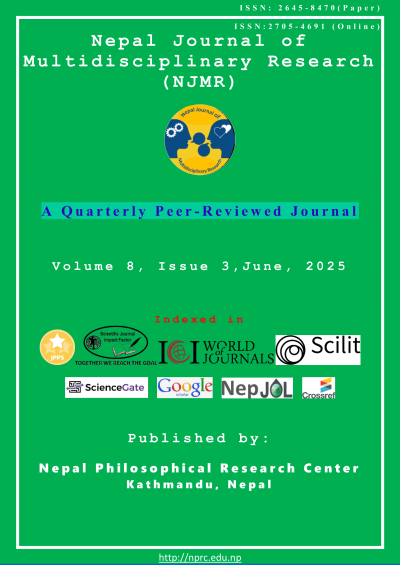Human Organs as Commodities: A Critical Study of Kazu Ishiguro’s Never Let Me Go
DOI:
https://doi.org/10.3126/njmr.v8i3.79295Keywords:
Capitalist machine, consumer culture, dehumanization, human body, organ harvestingAbstract
Background: This paper explores Kazuo Ishiguro’s Never Let Me Go (2005) as a critique of capitalist consumer society, focusing on how human beings are transformed into commodified entities under the guise of progress and care. Through the characters of Kathy, Tommy, and Ruth—clones raised for the sole purpose of organ donation—this study presents a dystopian reflection of late-stage capitalism, where life itself becomes a consumable product. Hailsham, a seemingly progressive boarding school, is revealed to be a corporate apparatus designed to normalize and aestheticize the commodification of bodies.
Methodology: This study employs a Marxist theoretical framework, incorporating Karl Marx’s concept of commodity fetishism and alienation, Fredric Jameson’s analysis of late capitalist culture, and Max Weber’s understanding of bureaucratic rationalization. These frameworks help illuminate how the novel critiques the transformation of human subjects into objects of exchange, where emotional attachments and personal identities are suppressed in favor of utilitarian value.
Results: Kathy’s reflective narration becomes a vehicle to expose the internalization of ideological structures that render resistance nearly impossible. The characters’ experiences of love, loss, and longing are systematically subordinated to the demands of bio-capitalism. Organ harvesting is not portrayed as a shocking exception but as the normalized endpoint of a society that values economic productivity over ethical considerations. The transition from Hailsham to the Cottages symbolizes a gradual but irreversible surrender to the capitalist logic that governs their lives.
Conclusion: The deaths of Tommy and Ruth, and the anticipated death of Kathy, exemplify the culmination of capitalist logic, where the body is wholly owned, managed, and exhausted for the benefit of others. Once a domain of human development, education is co-opted as a mechanism to produce docile, compliant subjects fit for exploitation.
Novelty: Ultimately, Never Let Me Go functions as an allegorical critique of consumer-driven modernity, where the human condition is eroded by systemic commodification. This study warns against a world in which efficiency overrides empathy, and individuals are reduced to replaceable components in a capitalist machine. Through its haunting portrayal of disability and silence, Ishiguro's work demands a rethinking of the ethical limits of consumerism and bio-political control.
Downloads
Downloads
Published
How to Cite
Issue
Section
License
Copyright (c) 2025 The Author(s)

This work is licensed under a Creative Commons Attribution-NonCommercial 4.0 International License.
This license enables reusers to distribute, remix, adapt, and build upon the material in any medium or format for noncommercial purposes only, and only so long as attribution is given to the creator.




